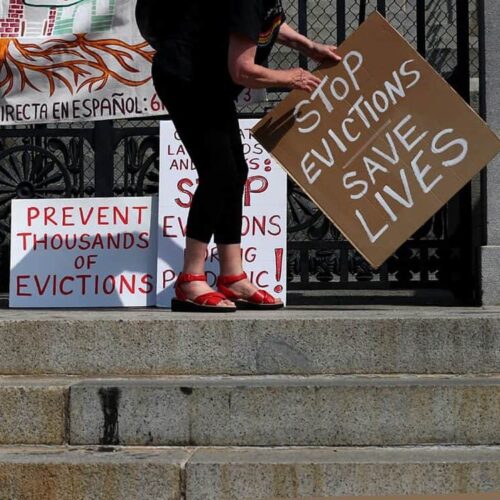Introduction
Update: Under pressure to act, the Centers for Disease Control and Prevention announced a new eviction pause Aug. 3 that will last two months and is aimed at renters in areas with substantial or high spread of COVID-19.
A federal ban staved off eviction for millions of Americans battered by pandemic job loss or other financial woes. Now it’s gone.
The eviction moratorium that expired over the weekend, housing advocates fear, was the only thing keeping large numbers of renters from sliding into homelessness. A surge in evictions is expected.
As COVID-19 began to spread across the U.S., Congress passed the eviction moratorium in the Coronavirus Aid, Relief, and Economic Security (CARES) Act. But because that applied to only about a third of the nation’s renters, landlords continued to file for eviction throughout the pandemic. Our analysis revealed that people in communities of color were far more likely to receive eviction notices than those in white neighborhoods.
State leaders set aside at least $2.6 billion from the CARES Act’s Coronavirus Relief Fund to help struggling renters. But more than $425 million of that hadn’t made it to renters or their landlords within a year.
More than a dozen states, including Illinois, Indiana, Oregon and Washington, reported distributing every dollar of the rental assistance by March 31. Meanwhile, Georgia, West Virginia, Tennessee, each of which have higher than average historic eviction rates, never set up relief programs in 2020.
Congress allocated more rental assistance money — nearly $47 billion — in December and March. But that help has also been slow to arrive.
On Friday, President Joe Biden called on government agencies to immediately get the money to renters and landlords.
“Every state and local government must get these funds out to prevent every eviction we can,” he said in a press statement.
Read more in Health
Coronavirus and Inequality
The evidence is piling up that pregnant people should get vaccinated
Yet only a third in the U.S. have gotten the COVID-19 shot.
Coronavirus and Inequality
Once again, some states are choosing who gets COVID-19 care
After Public Integrity showed that emergency plans allowed rationing care to people with disabilities, health experts debate who should be at the front of the line.




Join the conversation
Show Comments